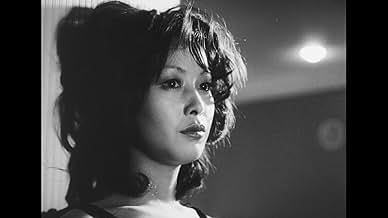IMDb-BEWERTUNG
6,2/10
1121
IHRE BEWERTUNG
Füge eine Handlung in deiner Sprache hinzuA revolutionary faction steals some hand bombs. While escaping, several soldiers are killed. The movement's highest authority deems October unfit and sends the leader of another faction to t... Alles lesenA revolutionary faction steals some hand bombs. While escaping, several soldiers are killed. The movement's highest authority deems October unfit and sends the leader of another faction to take the remaining bombs.A revolutionary faction steals some hand bombs. While escaping, several soldiers are killed. The movement's highest authority deems October unfit and sends the leader of another faction to take the remaining bombs.
Empfohlene Bewertungen
This is an excellent film, flawed in the sense that certain aspects of the fictional revolutionary group appear quite caricatured at times but viewed in relation with director Koji Wakamatsu's newest film "United Red Army" it can be seen to draw a surprisingly accurate picture of the revolutionary nihilism of the Japanese student activists of the time. Other reviewers have compared the film to Godard's early work such as La Chinoise and admittedly the artistic style is quite similar though less refined, and far from being less politically aware than Godard, Wakamatsu was actually much more realistically cynical in his portrait of armed student activist cells whereas Godard's revolutionary themed films displayed a certain hopeful naiveté in the potential of a largely dogmatic and authoritarian movement which was strongly criticized by his contemporaries in the Situationist International. The writer of this film Masao Adachi was certainly not a pretentious intellectual out to exploit sex and revolutionary pop aesthetic as some critics have inferred here; a closer look at his personal history shows that shortly after writing the screenplay he actually moved to Lebanon to join the real life armed revolutionary group the Japanese Red Army where he remained a committed activist for 28 years up until his arrest in the year 2000. As such the film can be a unique and telling account of his own mentality and the personal motivations which led to joining the JRA, as well as his prior knowledge of the less-than-ideal dynamics of the lifestyle he would be choosing. One must keep in mind that at the time Wakamatsu was expected by producers to be making films in the 'pink' genre which would explain the gratuitous sex scenes that could be seen as offensive or pointless to some but the unique beauty of the film far outweigh it's occasional rough edges. Highly recommended, though not for casual viewers of film "for entertainment's sake" alone.
Having greatly enjoyed Wakamatsu's earlier film Go, Go Second Time Virgin, I was very excited to come across this one. The excitement was however short lived. Or should I say endless because that is about how long this movie seems. Rarely have I looked at the counter on my VCR more often to see how much more I would have to endure.
It was much the same feeling as when after seeing Godard's wonderfully early new wave movies, I was subjected to La Chinoise or Pierrot Le Fou. Actually Ecstacy of the Angels seem very much inspired by this more avant-garde side of Godard's film-making. But without the originality.
There is plenty of sex and violence here, and layers and layers of what is most likely satire on political idealism and the media's exploitation of sex and violence. And possibly even sex and violence in cinema itself. A film mocking film maybe. There is that term yet again: Sex and violence. Usually a safe recipe for good entertainment, be it in celluloid or newsprint form. But the problem here is that the message is lost in all the boring scenes and purposely stiff dialog. You will quickly lose track of who belongs to which revolutionary faction. You are probably supposed to. Is the movie supposed to show us how predictable and repetitious our lust for sex and violence is? Because it's all the same here. Every scene is just more of the same. Tedious repetition. Maybe that is the message. Is that why all the characters are named after seasons and weekdays? Possibly.
Whatever it is, it all seems rather outdated and unoriginal now. It's just plain boring. Maybe it wasn't in Japan in 1972.
You do sort of get a picture of the screenplay being written on a roll of toilet paper by a couple of drunk pretentious intellectuals looking for an excuse to get some young actresses to take their clothes off. Which would in that case be the one side of this movie that would seem perfectly reasonable to me. I'm sure there is an intellectual masterpiece in there somewhere. A deeper meaning. But life is just to short to look for it. I simply cannot bear to watch this one again.
It was much the same feeling as when after seeing Godard's wonderfully early new wave movies, I was subjected to La Chinoise or Pierrot Le Fou. Actually Ecstacy of the Angels seem very much inspired by this more avant-garde side of Godard's film-making. But without the originality.
There is plenty of sex and violence here, and layers and layers of what is most likely satire on political idealism and the media's exploitation of sex and violence. And possibly even sex and violence in cinema itself. A film mocking film maybe. There is that term yet again: Sex and violence. Usually a safe recipe for good entertainment, be it in celluloid or newsprint form. But the problem here is that the message is lost in all the boring scenes and purposely stiff dialog. You will quickly lose track of who belongs to which revolutionary faction. You are probably supposed to. Is the movie supposed to show us how predictable and repetitious our lust for sex and violence is? Because it's all the same here. Every scene is just more of the same. Tedious repetition. Maybe that is the message. Is that why all the characters are named after seasons and weekdays? Possibly.
Whatever it is, it all seems rather outdated and unoriginal now. It's just plain boring. Maybe it wasn't in Japan in 1972.
You do sort of get a picture of the screenplay being written on a roll of toilet paper by a couple of drunk pretentious intellectuals looking for an excuse to get some young actresses to take their clothes off. Which would in that case be the one side of this movie that would seem perfectly reasonable to me. I'm sure there is an intellectual masterpiece in there somewhere. A deeper meaning. But life is just to short to look for it. I simply cannot bear to watch this one again.
The film is a dated, incoherent, and pretentious rambling about fictional revolutionary, or rather quasi-revolutionary, terrorist group(s) in Tokyo in the sixties. Although there may be some resemblance to early Godard, Wakamatsu seems to be much less accomplished thinker, revolutionary, or craftsman than the French master of the New Wave. Notwithstanding the typically Asian overacting, all the persons in the "plot" act as detached mechanical puppets (perhaps intentionally?). They are not good in making either revolution or love. The frequent sex scenes were quite irritating not only because the participants recited quasi-political slogans, but also due to sometimes awkward choreography or cuts necessitated by the bizarre Japanese censorship law that does not allow a glimpse of pubic hair on the screen.
I wonder if the sign "WEAPON WEARHOUSE" on a weapon warehouse in the film is a joke for insiders or rather a testimony on the level of production values in this movie.
I wonder if the sign "WEAPON WEARHOUSE" on a weapon warehouse in the film is a joke for insiders or rather a testimony on the level of production values in this movie.
Do you like hot chicks? Do you like it when they take their clothes off? Do you like it when they speak a language you don't understand? I DO! This is my new favorite movie. It also has a PLOT. I give it a 4 out of 10!
Koji Wakamatsu's "Ecstacy Of The Angels" runs for a mere eighty-nine minutes. After it ended it felt more like eight nine hours. Wakamatsu, known as the "Pink Godfather" (no, don't ask me why), was a pioneer of the pinku eiga genre. I had never heard the name Wakamatsu before. According to the blurb in the festival guide, "Ecstacy of The Angels" is a parable about a revolutionary organization torn apart by betrayal, its members descending into paranoia, sadism and sexual decadence. It sounded like a plot from an early Godard film, only from a Japanese perspective. This sounded interesting, I thought. It was about as interesting as having a tooth extracted. The opening sequence, in black and white, is set in a nightclub. A female singer screeches absurd lyrics, while at a nearby table three men and a woman sit in silence. Pretty soon though, I couldn't figure out which revolutionary faction was which, and by that time I was beyond caring. The actors don't just speak their lines, the bellow them at each other, as if they were all auditory challenged. In the frequent sex scenes (which are about as erotic as two storefront mannequins coupling), they go through the motions of sexual congress while mouthing absurd platitudes about fighting for the revolutionary cause. Frankly, Wakamatsu is definitely no match for Godard. Which reminds me, I need to visit my dentist for a check up. It'll be less painful all round.
Wusstest du schon
- WissenswertesThis film was released in a time of violent social turmoil for Japan. ATG, the film's distributor, got cold feet when a rash of Christmas tree bombing, similar to the one in the movie, started to plague the streets of Tokyo. The film was quickly withdrawn from distribution and briefly re-released in the art theater circuit.
- PatzerWhile the revolutionaries enter the base, a sign reading "weapon wearhouse" instead of "weapon warehouse" is clearly visible for several seconds.
- VerbindungenEdited into Gli ultimi giorni dell'umanità (2022)
Top-Auswahl
Melde dich zum Bewerten an und greife auf die Watchlist für personalisierte Empfehlungen zu.
- How long is Ecstasy of the Angels?Powered by Alexa
Details
Box Office
- Weltweiter Bruttoertrag
- 585 $
- Laufzeit1 Stunde 29 Minuten
- Farbe
- Sound-Mix
- Seitenverhältnis
- 2.35 : 1
Zu dieser Seite beitragen
Bearbeitung vorschlagen oder fehlenden Inhalt hinzufügen

Oberste Lücke
By what name was Tenshi no kôkotsu (1972) officially released in Canada in English?
Antwort

















